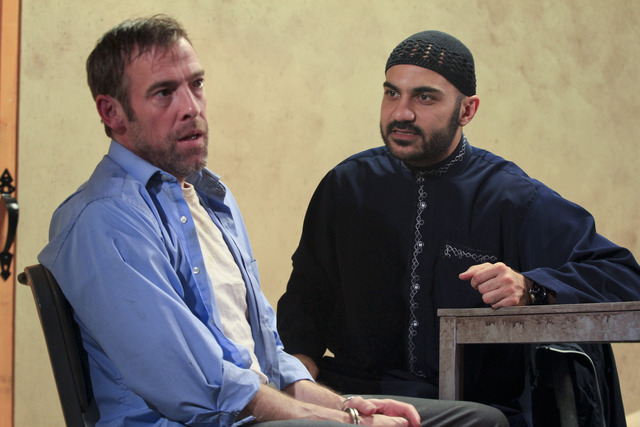Theatre Exile’s production of THE INVISIBLE HAND features an all-star creative team, including director Matt Pfieffer and actors Ian Merrill Peakes as Nick Bright, Maboud Ebrahimzadeh as Bashir, and Anthony Mustafa Adair as Dar. Henrik Eger conducted interviews with all four. In this interview, we hear Ian Merrill Peakes’s thoughts on this provocative new work. [Studio X, 1340 S. 13th Street] May 12-June 5, 2016; theatreexile.org.

Henrik Eger: What was your first response reading the script of The Invisible Hand?
Ian Peakes: When I first read the play, I immediately wrote Matt Pfeifer [the director] and said I want to do this. I love the whole play, but it was the chance to portray such a subdued character that appealed. Not that Nick doesn’t have a lot to contend with over the two hours of this play, but it’s in a more internal way.
I have been on a great streak of pretty bombastic characters. So, the opportunity to do the polar opposite of say, Black Stache in Peter and the Starcatcher [by Rick Elice at the Walnut Street Theatre], was extremely appealing. I loved that [The Invisible Hand] challenges us to view “others” through a different filter—selfishly, I really wanted to do this role.
Henrik: What did you bring to this challenging play as an actor?
Ian: So, what I brought to the role as an actor was a whole pile of history. I have been playing the dominant character on stage quite a good deal lately. That helped me to understand where dominance comes from, and it is not from the dominant person on stage. If power isn’t given to you by the other actors, well, simply, you have none. You can’t act power.
I have been very fortunate to have played with a bunch of terrific actors who gave me all the power when it was needed. My only training in this business was being raised in a theater and I have always been a watcher of actors working. Fascinating thing, that—an actor at work. So, to this role, as to almost every role I have or will play, I take all the good, effective work I have seen others do and trust it, and then make it my own.
Also, this play depends on listening and given circumstances. I’m good at those and I knew that would come in handy in this production. By given circumstances, I mean to put yourself in the actual position your character is in and take the ride from there. If the play is well crafted, as this one is, it’s pretty easy from there. Trust. Listen. React.
Henrik: What surprised you about the play and/or your own evolution during the rehearsal process and the performances?
Ian: The biggest surprise for me was the depth of the relationship between Bashir [played by Maboud Ebrahimzadeh] and Nick [played by Peakes]. I got it a little on my first quick read, and it became more clear as I was doing my pre-rehearsal work. But, man, Maboud and I found levels in their relationship that I find compelling as hell. We have never worked together and only met a week or so before rehearsals started at the photo shoot for the play. Suffice to say, we like playing together on stage. We don’t even talk about developing moments—they just happen.
Yes, we have a special chemistry, but you can give a majority of the credit to [playwright] Ayad. He wrote an insane relationship play and surrounded it with all this talk of banking, stocks, drones, and terrorism. And that was the biggest surprise for me.
Henrik: Do you have a sense that audiences and theatre critics relate to the complexity of this play, or do you have a sense that some folks might label the three Pakistani characters as one-dimensional terrorists while considering you as the American hostage as the only real human being in the play?
Ian: Whether the audience leaves feeling that to be the case or not is irrelevant. The fact that it’s true for me means the story will be more rich, layered, deep, and, at the end of the day, a better experience for the audience—and definitely more complex and harder to compartmentalize. Ayad shows you some stereotypical stuff, and then he takes it away.
Henrik: What is the invisible hand that drives you in your life as an actor and a mensch?
Ian: I feel very fortunate to call acting my profession. It is not every production that becomes this fully realized and rewarding. I love my guys in the show. Trust them implicitly. Matt Pfeifer is one of my oldest and dearest friends, and to take this journey with him at the helm at this juncture in his life has been special for me on many levels. This play makes me really excited to go to work every night. Everyone should see it.
Henrik: Is there anything else you would like to share?
Ian: I wrote some quick thoughts as my child has a play date with a class mate. I answered three or four only. Sorry. Hope there’s something there useful.
[Studio X, 1340 S. 13th Street] May 12-June 5, 2016; theatreexile.org.
